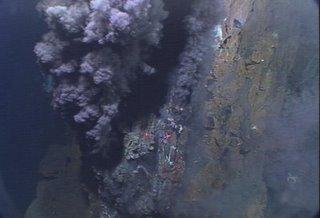Cruising in the South Pacific
Professor Lise Øvreås is participating in a research cruise in the Lau basin, east of Fiji, where scientists are investigating extreme organisms living around the hydrothermal vents found there.

Main content
It is a geologically interesting area. The Lau basin lies east of Fiji and west of the convergent intersection between the Australian and Pacific plates; the Tonga trench. It is a back-arc basin due to it's location behind the volcanic arc that formed through subduction processes. Within the basin lie two intermediate-rate oceanic spreading systems. Here the spreading ridge (ELSC in the north, and the Valu Fa Ridge (VFR) in the south), is farther from the subducting plate in the north, and gradually gets closer to the subducting plate to the south.
The cruise participants inform us that in the Lau Basin it is possible to study how geophysical, petrologic, hydrothermal and biological factors along the ELSC and VFR differ as a function of distance from the subducting plate and as a function of all of the other differences that co-vary with distance from the subducting plate (including depth and lava chemistry). (read Why is Lau such an interesting place to study? ) See the Research Objectives of the cruise.
The cruise is led by Øvreås' research colleague and collaborator, Anna-Louise Reysenbach (Portland State University). According to the participant descriptions, Anna-Louise is a microbial ecologist whose research focuses on high temperature ecosystems. Her lab combines classical culturing techniques with genomic approaches to explore the diversity and role thermophiles play in terrestrial and deep-sea hydrothermal systems. During the 2005 research cruise to the ELSC, her lab isolated the first true thermoacidophile from deep-sea vents, which represents a new branch in the Archaea. (Read more about her lab and work )
The cruise set sail aboard the RV Thomas Thompson 12 June. It uses the Wood's Hole ROV, Jason II to visualise and sample around the vents (learn more).
Lise Øvreås writes that she is having a great time and is seeing so many different and spectacular vent systems, including chimneys of more than 30 m tall and temperatures above 350 C! She invites us all to share the experience by reading the web-based blog.
